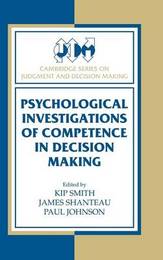
|
Psychological Investigations of Competence in Decision Making
Hardback
Main Details
| Title |
Psychological Investigations of Competence in Decision Making
|
| Authors and Contributors |
Edited by Kip Smith
|
|
Edited by James Shanteau
|
|
Edited by Paul Johnson
|
| Series | Cambridge Series on Judgment and Decision Making |
|---|
| Physical Properties |
| Format:Hardback | | Pages:254 | | Dimensions(mm): Height 229,Width 152 |
|
| ISBN/Barcode |
9780521583060
|
| Classifications | Dewey:153.83 |
|---|
| Audience | | Professional & Vocational | |
|---|
|
Publishing Details |
| Publisher |
Cambridge University Press
|
| Imprint |
Cambridge University Press
|
| Publication Date |
3 May 2004 |
| Publication Country |
United Kingdom
|
Description
The premise of this book is that many of the experiences we encounter are novel, infrequent in our experience, or variable with respect to action to be taken. Others require decisions to be made in the face of ambiguous or incomplete information. Time pressure is frequently tight and penalties for failure are severe. Examples of such situations include investing in markets, controlling industrial accidents, and detecting fraud. These are environments that defy a definition of optimal performance. The authors refer to domains without criteria for optimal performance as 'competency-based' and we describe the behaviour of individuals who work in them by the term 'competence'. The chapters explore the proposition that metacognitive processes - thinking about the kind of thinking that a task requires - give structure to otherwise ill-structured tasks and is a fundamental enabler of competence at decision making. Such metacognition facilitates performance.
Reviews' ... this book brings together an interesting and useful collection of modern decision making research ... Given the variety of ideas presented, this book may be useful for introducing applied decision making topics to graduate students. Taken together, this book serves its purpose of tying a variety of applied decision making situations whit theory and empirical findings, and should provide a useful resource for anyone exploring competent decision making in ill-defined, real-world situations.' Applied Cognitive Psychology
|